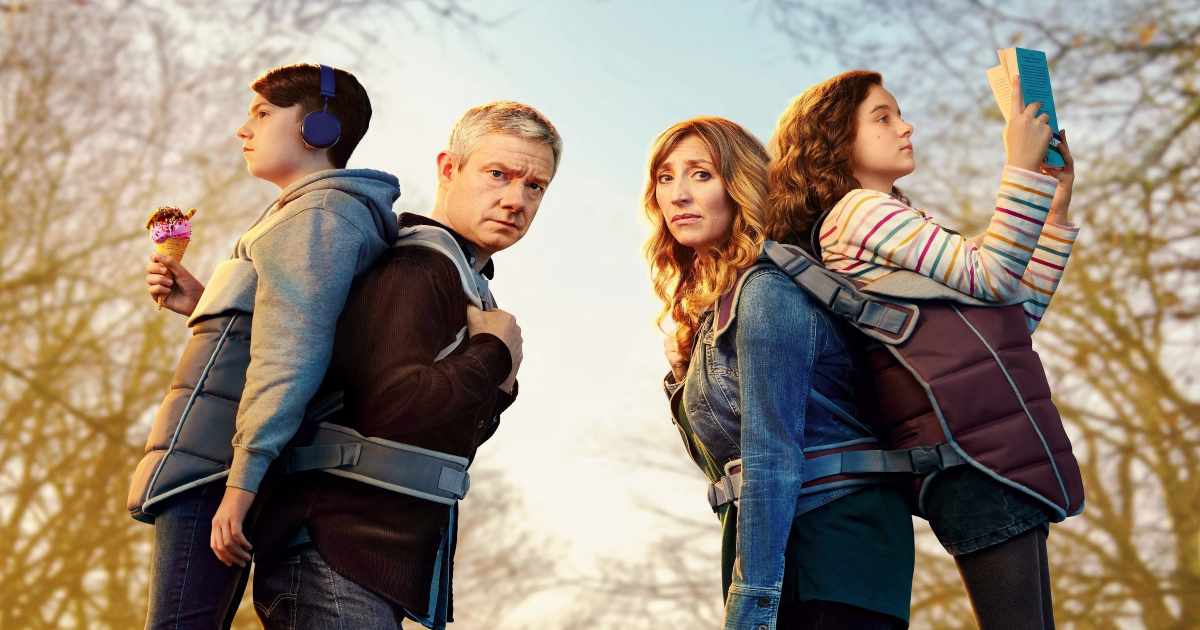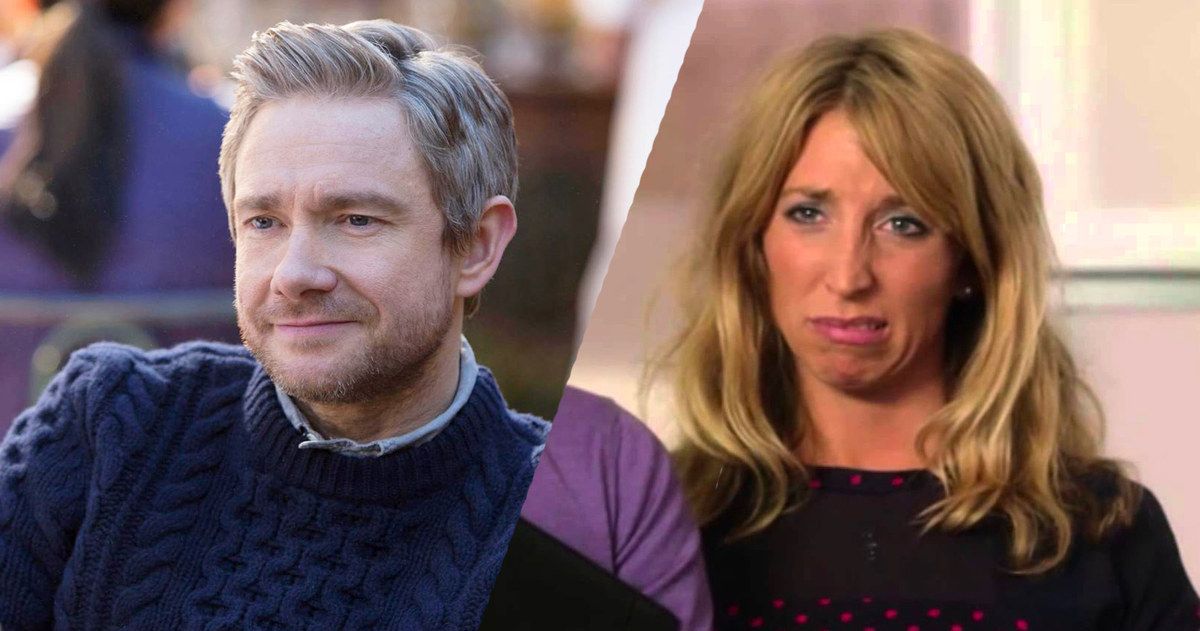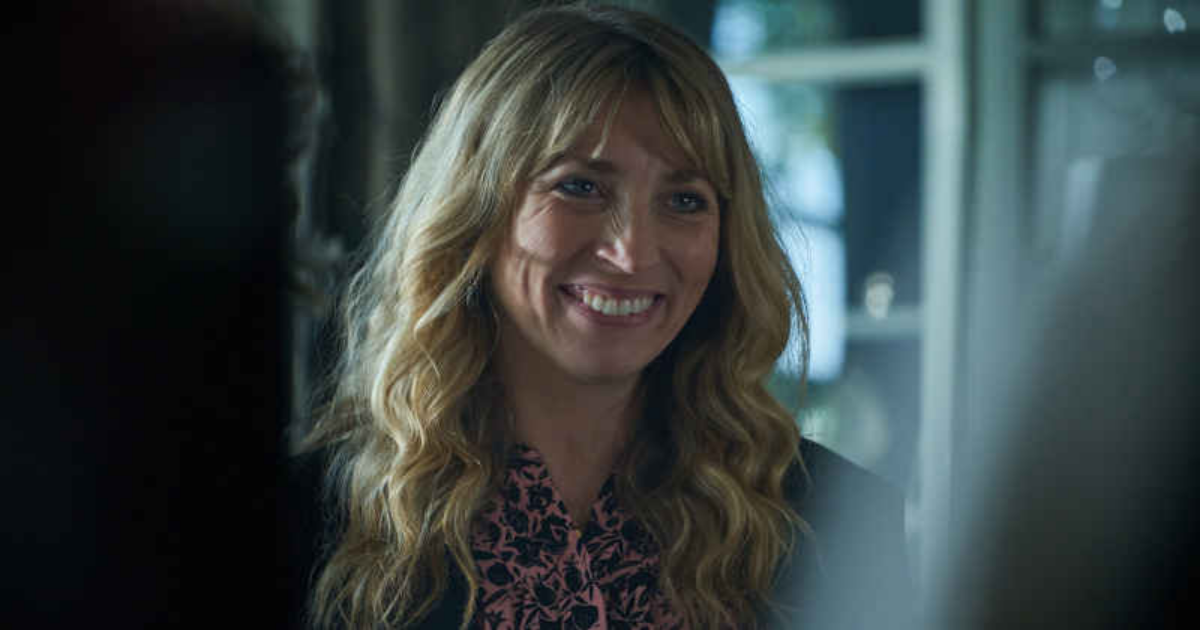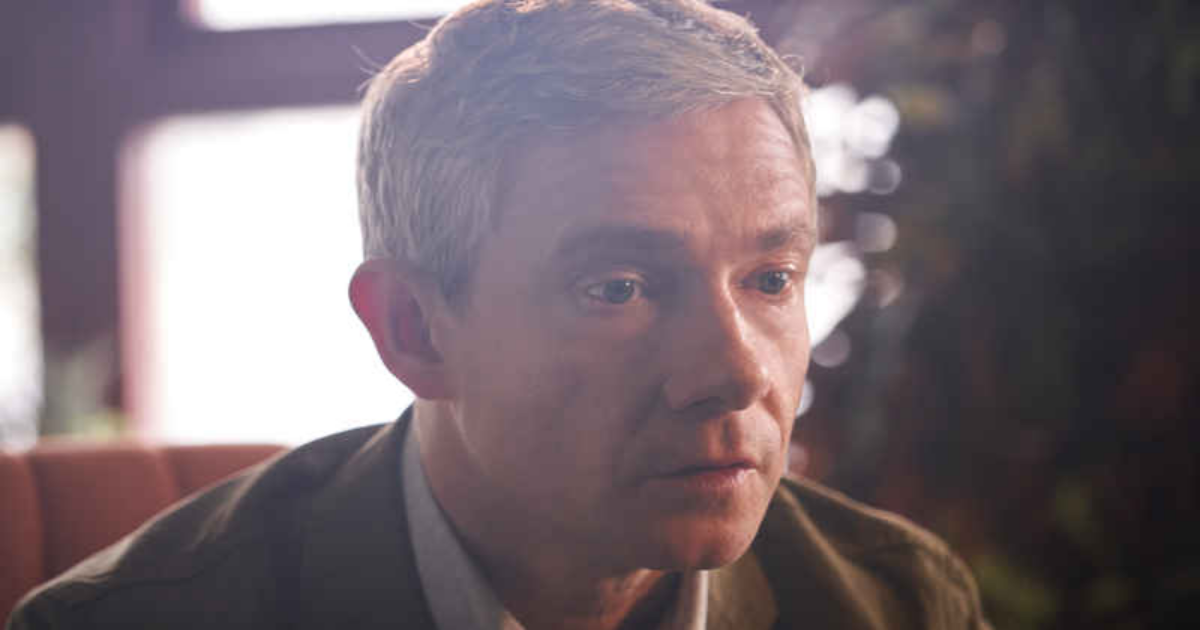Aside from cop shows, the family sitcom has probably been the most popular type of television program in the medium’s history. That’s likely because it’s the most relatable; while legal dramas, cop shows, and fantasy can all provide winning entertainment, almost nothing in the world is more relatable than both the joys and headaches of family. Breeders is unique in the televisual landscape for having the foundations of this kind of sitcom while willfully subverting it in surprising ways.
Breeders, on FX, begins like one of the many modern-day sitcoms about marriage and parenting (Catastrophe, Better Things, Parenthood, Motherland, Modern Family, et cetera ad infinitum). It opens with the frustrated husband Paul (Martin Freeman) and fatigued wife Ally (Daisy Haggard) debating about how to put the kids to bed after they wake in the middle of the night. They make a dark joke about killing their children, which isn’t too far off from the sarcastic asides of many frustrated TV parents, but it quickly becomes clear that this is not just a witty retort aimed at summoning laugh tracks. These parents are as real as fiction gets.
Breeders Was Made By Parents But For Anyone
Main co-star Haggard, a mother of two, remembers reading for this scene, “which was like a couple passive-aggressively discussing who was gonna get up the next time the child woke up,” as she describes it. “It was very, very familiar territory. So me and my husband actually read it in the self-tape, and we got the giggles because we were like, ‘I think we might have done this last night.’ So I sort of felt that it sounds quite natural to read, if that makes sense. It didn’t feel too soft, and it was what I was experiencing at that moment.”
Part of the naturalism of Breeders stems from its origins. Freeman developed the idea for the show after becoming a father himself, having an anxiety dream about trying not to scream at his children but doing it anyway. Breeders, recently debuting its third season to continued acclaim, extends much further than that simple dream (with wonderful character arcs depicting the realities of being human in the modern world), but uses this notion to appeal universally and not just to the parents in the audience.
As Freeman tells us, “it’s not being able to stop yourself from losing your mind with anger and frustration, even though every step of the way, you’re trying to talk yourself down, but something in you is not able to stop yourself, even though you know it’s a bad idea.” At its very core, it is about the monsters within us all, and how, no matter how hard we try, we can never really kill them for good. This is its darkness; its dim hope is that, with grace and patience, a family of monsters can learn to love and forgive each other.
Freeman and Haggard Take Inspiration From Parenting
Of course, if you are a parent, Breeders is absolutely essential viewing. It resonates so strongly not just because Freeman is a father, but because everyone in the writers’ room is a parent as well, along with main co-star Haggard. In fact, Haggard had just given birth to her second child when auditioning for the role, which she recounts hilariously:
For the first audition I did a self tape very angrily because I also had like a newborn, and it was in a car seat, and I was rocking her with my foot whilst I angrily just was like, ‘Why am I doing an audition? I just had a baby. This is ridiculous. I haven’t got it.’ And my other daughter was watching some sort of terrible cartoon in the background. Then I got a callback, and I went in […] just so tired and frazzled, like, ‘I shouldn’t be thinking about work,’ but somehow it might have been the magic ingredient.
Few television shows have represented the honest exhaustion and exasperation of parenting as Breeders has, and Haggard and Freeman (along with the writers’ room) undoubtedly tap into their personal experiences as parents in the process. It’s difficult enough being parents, but being a busy and successful actor on top of it, like Freeman (Sherlock, Fargo, The Hobbit, The Office) and Haggard (Psychoville, Back to Life, Hilda, countless British comedy shows), seems even more challenging.
Making the show seems to not only help parents in the audience feel heard but allows the cast and crew to work through parenting itself. Freeman likens the initial meetings with co-creators Simon Blackwell (Veep, The Thick of It) and Chris Addison (The Hustle, The Thick of It) as a kind of men’s self-help group for fathers. Haggard’s own children are younger than her onscreen kids (which age after a time jump between seasons); “I always say about Breeders that, because my kids are so much younger,” she says, “I look ahead [at my children’s future] and sometimes go, ‘Oh no, is this to come for me in my journey as a mother?'” She continues:
You have children in, as you say [in the U.S.] diapers, or nappies, and then you think, ‘Oh, when I’m through that, it’s going to be much easier.’ And Breeders is like, no, no, no. Because then you’ll have these new problems, and these new wonderful moments. So it can be quite daunting, even the awareness now of what that would be like to have teenagers, because I have a seven-year-old and a four-year-old, so I’m in such a different zone.
Freeman’s children are now a bit older, old enough that they actually watch the show with him. It seems surprising to think of showing your kids a series you made about them, in which you play an impatient father with anger issues, but it’s been an interesting experience for the Freeman family. He says:
They did find it funny, and they find it quite gripping. They do want to know, particularly my son actually, he does really want to know what’s coming next. What’s going to happen next between Luke and Paul. This father and son dynamic went completely off the rails at the end of series two, when Luke the teenage boy hits his father and draws blood. Yeah, he’s really keen to know what happens next. I think last night, they half-jokingly said that I owe them commission because [Breeders] would never come about if they weren’t my children, which is true, but they’re not getting any money.
Haggard’s daughter is less positive about the show; though she’s too young to have seen it, she did catch a glimpse of the script. “She just appears suddenly with this look of absolute rage,” Haggard laughs, “holding a script that has a rude word in it and just being like, ‘Is this your job?’ […] I can’t believe you teach us not to say these words.”
‘TV is a Liar,’ But Breeders Tells the Truth
It may seem odd to call a family comedy “gripping,” but that’s exactly what Breeders is. It’s a dark comedy, but it’s also an often edge-of-your-seat drama about the damage we do to ourselves and each other, about nature versus nurture, cycles of violence, and how easily love creates a breeding ground for anger and resentment. It fits in well with Freeman’s desire to find darker roles by turning down ‘nice guy’ parts.
“We were interested in making it because we were all fathers,” Freeman says, referencing Blackwell and Addison, “we all have children who we love, but also we got the concept that just because you love someone, doesn’t mean you don’t get completely welled up by them. In fact, quite the opposite, very often. The more you love someone, whether it’s your parents or your kids or your partner, you know, they can drive you to destruction in the very next breath.”
To convey this deep truth about the human condition in the confines of a family comedy often required that the cast and crew (who are all extremely funny people) go against some of their instinctual comedic urges in order to be as honest and authentic about parenting as possible. Sometimes Freeman would literally tell the writers’ room to be less funny.
Haggard has experienced something similar recently, making her great show Back to Life as melancholic and heartbreaking as it is funny. That show and Breeders point toward a kind of ‘sadcom’ which takes the trappings of sitcom but uses it to explore deeper existential themes like depression and personal traumas like substance use disorder (as seen in depressing comedies like Bojack Horseman, Rick and Morty, and many more).
“From the conception of it,” Freeman says, “[we thought] wouldn’t it be interesting if you could make a comedy show that was still a comedy show, but going as dark as possible within those parameters? And it’s not, you know, it’s not a traumatic drama, it’s still comedy, but it goes as dark as it can go.” Freeman continues, describing the uniqueness of Breeders perfectly:
I’d seen family comedy shows where it’s basically, ‘You little rascal, wait till I get my hands on you,’ sort of thing, but not with real conversations and real freakouts that happened in my life and happened in my life as a kid as well. […] I think Paul and Ally absolutely adore their children. They also are driven to distraction at times, and for me, that’s never really felt like a conflict, and it’s never felt like a contradiction.
I think sometimes TV is a liar, it’s lying to us about that. You know what I mean? It’s like, we all know what everyone grew up. I don’t know a single person who grew up with no voices being raised, and no doors being slammed, and no threats. And very often with no one getting hit, though I know plenty of people who would be hit quite a lot by parents who they now love and who they respect. And, again, this isn’t a manifesto for screaming at your kids, but it’s just, it’s an acknowledgement that life is more complicated than the Brady Bunch.
The third season of Breeders is currently airing on FX at 10 p.m. EST on Monday nights, and the first two seasons can be streamed on Hulu. It’s not to be missed.
Read Next
About The Author






.jpg?fit=crop&w=100&h=100)